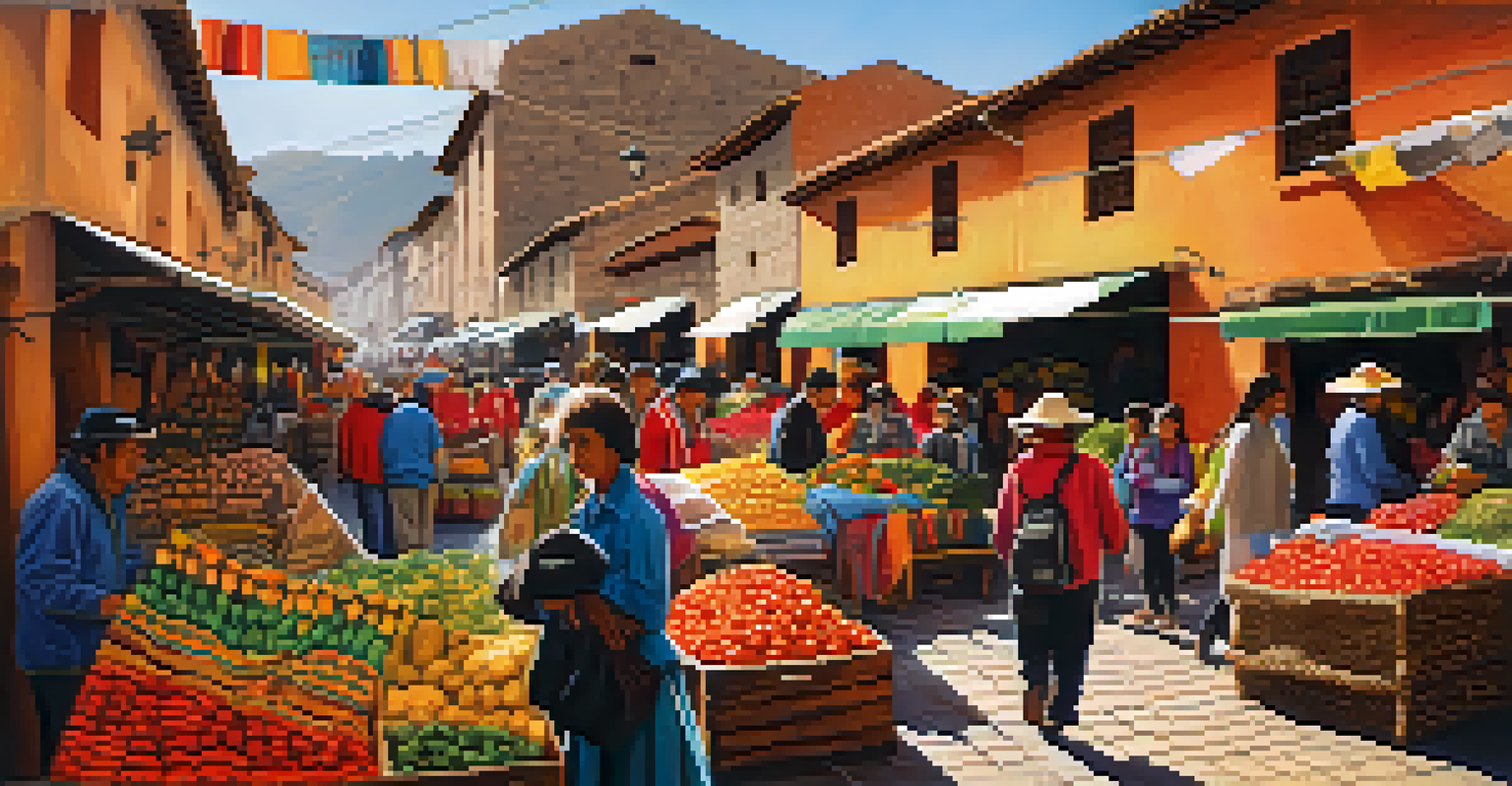Health Precautions for Travelers Visiting Peru

Understanding Peru's Unique Health Risks
Traveling to Peru is an exciting adventure, but it comes with its own set of health risks. The diverse geography, from coastal areas to high mountains, exposes travelers to various diseases and health concerns. Understanding these risks can help you prepare and stay safe during your travels.
Traveling – it leaves you speechless, then turns you into a storyteller.
One major concern is altitude sickness, especially in places like Cusco and Machu Picchu. This occurs when you ascend to high altitudes too quickly, leading to symptoms like headaches and nausea. It’s vital to acclimatize properly by spending a few days at lower altitudes before heading higher.
Additionally, travelers should be aware of food and water safety. Contaminated food and water can lead to gastrointestinal issues, a common problem among visitors. Being informed about these health risks allows you to take the necessary precautions for a more enjoyable trip.
Vaccinations and Preventative Medications
Before traveling to Peru, it's crucial to check if your vaccinations are up to date. Recommended vaccines include Hepatitis A, Typhoid, and Tetanus, which can protect you from common diseases. Consult your healthcare provider at least 4-6 weeks before your trip to allow time for any necessary shots.

In some areas, particularly the jungle regions, vaccinations for Yellow Fever may be required or strongly recommended. This mosquito-borne disease can be serious, so getting vaccinated is a proactive step to ensure your health.
Prepare for Altitude and Illness
Understanding altitude sickness and food safety is essential for a healthy trip to Peru.
Additionally, consider carrying a supply of preventative medications for altitude sickness, such as acetazolamide. This can help you adjust more comfortably to high elevations and minimize any adverse effects during your travels.
Staying Hydrated and Safe with Food Choices
Staying hydrated is essential while traveling, especially in Peru's varying climates. Always drink bottled or purified water, and avoid tap water to prevent illnesses. It’s also a good idea to carry a reusable water bottle with a filter for convenience and sustainability.
The journey of a thousand miles begins with one step.
When it comes to food, opt for well-cooked meals, and be cautious with street food. While it can be tempting to try local delicacies, make sure they are prepared in clean conditions to reduce the risk of foodborne illnesses. Fresh fruits and vegetables should be washed or peeled before consumption.
By making smart choices about what to eat and drink, you can enjoy Peru's rich cuisine while minimizing health risks. Remember, a little caution goes a long way in ensuring a delightful culinary experience!
Protecting Yourself from Insects and Wildlife
Peru's diverse ecosystems host various insects and wildlife that can pose health risks. Mosquitoes, in particular, can transmit diseases like dengue and malaria. To protect yourself, wear long sleeves and use insect repellent containing DEET, especially in jungle areas.
Additionally, be mindful of wildlife interactions. While it can be tempting to get close to animals, remember that they can carry diseases and parasites. Observing wildlife from a safe distance helps protect both you and the animals.
Stay Updated on Vaccinations
Ensure your vaccinations are current, especially for diseases like Yellow Fever, before traveling to Peru.
By taking these precautions, you can enjoy Peru's natural beauty without compromising your health. It’s all about finding that balance between adventure and safety in this vibrant country.
Understanding Local Health Care Access
Before traveling, familiarize yourself with the local health care system in Peru. Although major cities like Lima have well-equipped hospitals, rural areas may lack adequate medical facilities. Knowing where to go in case of an emergency can save crucial time and stress.
Travel insurance is highly recommended as it can cover any unexpected medical expenses. Make sure your policy includes coverage for emergency evacuations, especially if you’re planning to hike in remote areas. Having a plan in place ensures you can access necessary care without financial strain.
Don’t forget to bring a basic first aid kit with you. Include items like band-aids, antiseptic wipes, and any personal medications. Being prepared can help you handle minor injuries and ailments effectively during your travels.
Traveling with Chronic Conditions
If you have a chronic condition, planning ahead is key to a successful trip to Peru. Always carry enough medication for your entire stay, plus a little extra in case of delays. Bring copies of your prescriptions and a letter from your doctor explaining your condition and treatments.
It’s also wise to research how your condition may be affected by travel. For instance, if you have respiratory issues, high altitudes can be challenging. Discuss your travel plans with your healthcare provider, who can offer tailored advice and adjustments to your medication regimen.
Know Local Health Resources
Familiarizing yourself with local health care options and emergency contacts can provide peace of mind during your travels.
Being proactive about your health ensures you can focus on enjoying your travels rather than worrying about your condition. Many travelers with chronic conditions have successfully explored Peru with the right preparation and mindset.
Emergency Contacts and Local Resources
Before you embark on your journey, jot down important emergency contacts, including local hospitals, your embassy, and travel insurance details. Having this information at hand can be a lifesaver in case of an emergency. Share these details with a travel companion for added safety.
In addition to emergency numbers, familiarize yourself with local resources, such as pharmacies and clinics. Knowing where to find medical assistance can alleviate anxiety while traveling. Many major cities have 24-hour pharmacies for over-the-counter medications.

Lastly, don’t hesitate to reach out to locals for guidance. Peruvians are often friendly and willing to help travelers in need. Building connections can enhance your experience and provide vital support if health issues arise.
Enjoying Your Trip While Staying Healthy
Traveling is about exploration and enjoyment, and staying healthy should complement that experience. By taking the necessary precautions, you can immerse yourself in Peru's rich culture and stunning landscapes without worry. Balance adventure with awareness to ensure a fulfilling trip.
Stay informed about your health and any potential risks, but don’t let it overshadow the joy of discovery. Engage with locals, try new foods, and explore the breathtaking scenery while keeping your health in check. A little mindfulness can lead to unforgettable memories.
Remember, your well-being is paramount. With the right preparation, you can make the most of your Peruvian adventure, creating cherished moments that last a lifetime. Safe travels!